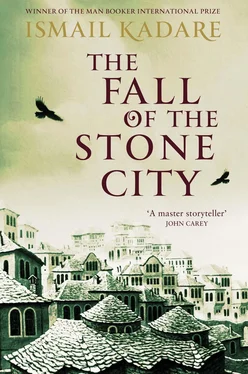The colonel broke off and laid his hand on one of the scars on his forehead. When he spoke again, his voice was slow, almost heartbroken. “And so when they gave me orders to take this tank division and occupy Albania, my first thought was of you. I wouldn’t invade Albania but save it, unite it with the eternal Reich and of course, before anything else, I would find you, my brother. And I set off happily to the country where honour rules, as you used to say.”
His voice faltered and he fell silent for a moment. “Dr Gurameto, they fired on me in your city.”
His voice was now hoarse and he frowned. Big Dr Gurameto stood frozen to the spot.
“I was fired on,” the colonel went on. “I was betrayed. The advance party barely escaped with their lives. When they told me, my first thought was again of you. It was my fault for believing you. Nostalgia had turned me soft and without thinking I had put my men in mortal danger. I was beside myself. ‘Gurameto,’ I shouted, ‘you traitor, where’s your Albanian honour now?’”
The doctor stood transfixed, speechless. The colonel’s voice grew faint.
“I sent you word. I dropped thousands of leaflets from the air. I told you I was coming as a guest. I asked the master of the house, ‘Will you receive guests?’ And then came your reply. My men escaped by the skin of their teeth. When I saw my soldiers bent low over their motorcycles, I almost howled. All those things we talked about at the Widow Martha’s Tavern, did they mean nothing? Where is your honour, Dr Gurameto? Have you nothing to say?”
The doctor finally found his voice. “I didn’t fire on you, Fritz.”
“Really? It was worse than that. Your country fired on me.”
“I answer for my own house, not the state.”
“It comes to the same.”
“It doesn’t come to the same. I’m not Albania, just as you’re not Germany, Fritz. We’re something else.”
The colonel lowered his eyes thoughtfully. “Something else,” he murmured. “Well put. You’re an amazing man, Gurameto. You always were special. You’re the superman, aren’t you? You don’t belong to the real world.”
“Nor do you, Fritz.”
“You mean that’s why we don’t get on with the rest?”
“Perhaps. I’m still the person I was.”
“And I’m not? You mean that this uniform of mine, these scars, the war, the Iron Cross have changed me? I tell you, they haven’t, not in the slightest.”
“If that’s true, Fritz, and if you’re still the same person, I’m inviting you to dinner at my house, according to the customs we spoke about. Tonight.”
The colonel raised his hand to his scarred brow, as if struck by a blow. His icy stare seemed to say, “Come to dinner, in this country where they fired on me behind my back?”
He put his arms round Gurameto but this time his embrace was cold. Gurameto interpreted it as a refusal of his invitation and tensed his neck. But the reply was the opposite. Their final words were partly in Albanian and partly in archaic German.
As evening fell on the city, Big Dr Gurameto felt the weight of a sorrow he had never known before. He listened to the sounds of preparation for the dinner and looked out from the first floor veranda towards the gate of his yard, where his guest would knock.
The colonel came at the promised time and, strangely, his car drew up without a sound, as if it had glided through the air above the city to avoid being seen by anybody.
His guest seemed to have arrived so stealthily that the master of the house asked him if he should draw the curtains and turn off the gramophone.
To his surprise, the colonel said no. Certainly not. Wherever Colonel Fritz von Schwabe goes for dinner, especially in Albania, let the lamps be lit and the music sound, as custom demands. “You invited me to dinner, and here I am,” his voice boomed.
Smiling, he bounded up the staircase, followed by his aides and a soldier carrying a case of champagne. They entered the great drawing room, kissed the hands of the lady and daughter of the house and gave a curt nod to the doctor’s prospective son-in-law.
The slight embarrassment on both sides, perhaps because this was the first time any Albanian house had welcomed German servicemen, vanished at once when the guests took their places at the dinner table. Clearly the evening would go well. Cheerful toasts were raised. The conversation flowed without longueurs and paused without stalling. The colonel and his host sometimes talked tête-à-tête, teasing each other with recollections of student days, which inevitably involved the names of drinks and young ladies. Mrs Gurameto’s sparkling eyes showed that this did not offend her in the slightest. Following the tradition of university feasts, the guests were provided with masks, which they wore or set aside as the fancy took them.
“My God,” sighed the colonel. His voice was not loud, but a silence fell. “My God,” he repeated, “for weeks, months, I’ve dreamed of visiting a house like this.”
His expression clouded over again. His voice softened, as it had that afternoon in the city square.
“For so many weeks, so many months,” he continued softly, “as I crossed the wasteland of Europe, with death and hatred all around me, I yearned for a dinner like this. Of all the possible houses in this whole sorry continent that I dreamed of visiting, yours was the very first.”
“I believe you,” Gurameto replied calmly.
“Thank you, brother. The prospect was doubly inviting, because the house was yours, and because it was Albanian. It was just as you said, like in Lekë Dukagjini : ‘Give me your word of honour, oh master of the house!’ What a magnificent phrase. The whole time I was thinking, quite rightly, that our ancient German customs are close to yours. The world has forgotten these customs, but we will bring them back. That’s what I told myself, as I travelled across wintry, frozen Europe. It was all ours, we were winning all the time, but something was missing.”
One of the officers tried to seize the opportunity of the silence to raise a toast, but at a glance from his superior he left his glass where it stood.
“And so, as I told you, when the order came to occupy — I mean to unite Albania, my first thought was that I would visit my brother. I would find him wherever he was. And look, I have come. But you. . You fired on me, Gurameto. Treacherously, behind my back.”
“It wasn’t me,” the doctor said quietly.
“I know. But you know better than I do that your Kanun of Lekë Dukagjini demands blood for blood. German blood was spilt. Blood is never counted as lost.”
Dr Gurameto awaited the verdict with his eyes closed.
“Eighty hostages will wash away that blood. While we are dining here, my men are rounding them up.”
The expression of the master of the house turned to stone. He had heard something about this, but had thought the order would be rescinded.
Everybody waited to hear how he would reply. That rigid face would produce something. For instance he might say, “Why tell me this?” Or, “You are my guest. Show me the respect that I have shown you.” Or he might simply pronounce the old formula that followed an insult to a table, according to the Kanun of Lekë Dukagjini , and go to the window to announce to the people that his German guest had violated his hospitality.
But Big Dr Gurameto said nothing of the sort. The thought in his mind was of something entirely different.
In fact it was not a thought at all but a sudden, incongruous flashback of the strange dream of which the colonel had reminded him a few hours before on the city square. Instantaneously and with blinding clarity he saw himself stretched out on the operating table. He looked up — the surgeon operating on him was himself. This came as a surprise to him but what struck him most was the expression on the surgeon’s face. It did not reveal whether the surgeon recognised him or not. Gurameto even wanted to say to him, “It’s me, don’t you know me?” But at that moment the surgeon, with the scalpel in his hand, gave a slight sign of recognition, as if this patient were a person he had met before. Again, Gurameto wanted to say, “Careful, be gentle, don’t you see it’s me, your own self?” But the surgeon donned his protective mask and Gurameto could only try to interpret the expression of this mask. It changed, sometimes suggesting that the surgeon would be gentle, as if to himself, but at other times the masked face conveyed the opposite impression, that he was the last person from whom Gurameto could expect kindness.
Читать дальше












